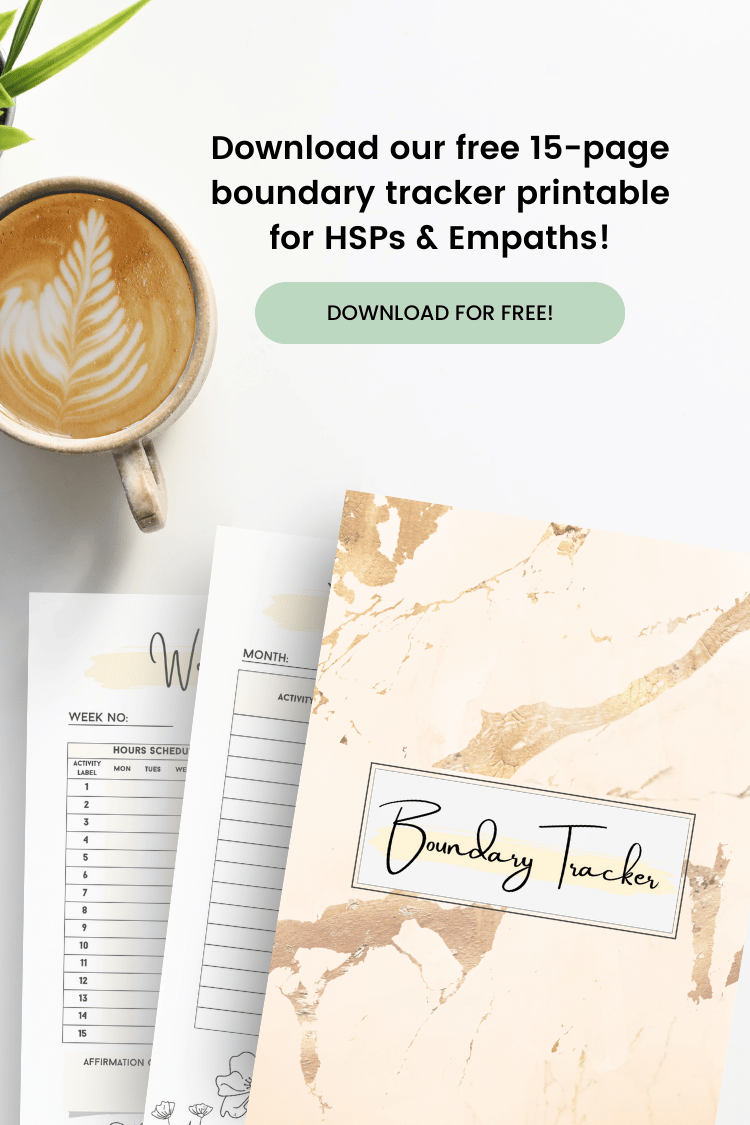Struggling with negative self-talk and a strong inner critic? Discover the most common signs that limiting beliefs are affecting your life.
Estimated reading time: 10 minutes
For highly sensitive people (HSPs), the internal world is vivid and complex.
Within this inner universe, limiting beliefs can be particularly obstructive, acting as barriers to fulfilling potential and experiencing life fully.
But what exactly are limiting beliefs?
Simply put, they are the subconscious thoughts we hold about ourselves, others, or the world that limit our ability to achieve our goals and desires.
Recognizing these beliefs is the first step in transforming them.
Here are 10 signs that you might be grappling with limiting beliefs!
Here’s What You’ll Learn:
- #1 Self-Doubt Shadows Your Steps
- #2 Fear of Failure Freezes You
- #3 Perfectionism Pervades Your Perspective
- #4 Overwhelm Overrules Action
- #5 Comparisons Curtail Contentment
- #6 Procrastination Prevails Persistently
- #7 Decision-making Becomes Daunting
- #8 Fear of Criticism Freezes You
- #9 Comfort Zone Becomes a Cage
- #10 Overwhelm Overrules Opportunities
- Transform Your Limiting Beliefs!
#1 Self-Doubt Shadows Your Steps
Imagine constantly walking under a cloud even on the brightest days; that’s what self-doubt does to you.
It’s a whisper in the back of your mind that colors your every action, asking “What if I’m not capable?”
This isn’t just indecisiveness; it’s a deep-seated belief that you might not be enough.
As a highly sensitive person, this isn’t merely a mental tug-of-war; it’s an emotional one as well.
Your heightened sensitivity amplifies this self-doubt, making it seem as though your skills and talents are perpetually under a microscope, scrutinized for every imperfection.
This doubt isn’t content to stay silent during big life decisions; it also seeps into the mundane, transforming routine tasks into mountains of indecision.
You might find yourself unable to trust your judgment, to the point where even choosing what to have for lunch becomes a drawn-out process.
For an HSP, the intense internal dialogue doesn’t just fade into the background—it’s a persistent echo, undermining confidence at every turn.
#2 Fear of Failure Freezes You
For many, failure is a dreaded specter, looming over every new endeavor.
If you find yourself paralyzed at the prospect of not succeeding, you’re likely grappling with a deep fear of failure.
It’s an icy grip on your heart, convincing you that every misstep will be a catastrophe.
This fear is magnified for the highly sensitive person; every scenario is felt more deeply, and every potential fallout is imagined in vivid, emotional detail.
It’s not just the fear of actual failure that troubles you; it’s the anticipated shame and embarrassment that might come with it.
This isn’t a fleeting concern but a constant barrier that stands between you and your aspirations.
You might find yourself avoiding opportunities, not because they don’t interest you, but because the fear of failing at them is too great a burden to bear.
It’s a self-fulfilling prophecy where you never fail because you never try, but the cost is high—countless paths unexplored and potential unfulfilled.
The fear keeps you in a state of inertia, where the risk of failure is so intimidating that it stifles the very action that could lead to your success.
#3 Perfectionism Pervades Your Perspective
Perfectionism is often touted as a virtue, a mark of someone who strives for the best.
However, when this pursuit turns compulsive, it’s a telltale sign of limiting beliefs at play.
Perfectionism can be an HSP’s armor, a way to shield oneself from criticism by leaving no room for error.
Yet, it’s a heavy armor to bear, often leading to endless refining and tweaking of work, sacrificing time and well-being for an unattainable standard.
This relentless drive for perfection often masks a fear of judgment and a belief that one’s worth is tied to performance.
When this is your reality, procrastination can become a close companion.
The pressure to execute perfectly becomes a barrier so formidable that starting any new task is delayed, sometimes indefinitely.
Tasks pile up, not because you’re incapable, but because the thought of starting and not achieving perfection is too overwhelming to confront.
For a highly sensitive person, the stakes feel even higher; every flaw feels magnified, and every critique cuts deeper.
It’s a cycle that breeds discontent and discouragement, as the bar you set for yourself reaches insurmountable heights, and satisfaction remains just out of reach.

#4 Overwhelm Overrules Action
Overwhelm can be a tidal wave, crashing over you at the thought of what lies ahead.
This is especially true when confronting tasks or decisions.
It’s not just a crowded to-do list or a challenging life choice; it’s a physical and emotional sensation that can leave you feeling stuck.
For the highly sensitive person, this overwhelm isn’t just about having a lot on your plate; it’s about feeling every item with intense clarity.
The ‘what ifs’ play out like a symphony, each note a possibility that demands consideration.
The resulting paralysis is not due to a lack of desire or ability, but rather from the sheer weight of the emotional and sensory input that comes with each potential outcome.
It’s like being at a crossroads with countless paths, each one shrouded in mist, and the pressure to choose correctly is suffocating.
This overwhelm can make even the most straightforward action seem like a Herculean effort, and the cycle of inaction feeds into the belief that you’re incapable of handling life’s pressures.
It’s a self-perpetuating state where the more overwhelmed you feel, the less you feel you can do, further entrenching the belief that action is beyond your reach.
#5 Comparisons Curtail Contentment
In a world bustling with success stories, it’s easy to fall into the comparison trap.
You see peers excelling and instantly, a voice whispers, “Why not me?”
But here’s the catch: that voice doesn’t whisper; for highly sensitive people, it roars.
You’re not just noting a difference; you’re weighing your entire worth against it.
Comparisons might start small, perhaps with a friend’s achievement or a colleague’s praise.
Yet, they quickly snowball into a mountain of self-doubt, obstructing your view of your own successes.
Social media amplifies this, presenting highlight reels that seem to dwarf your day-to-day victories.
The reality, though, is often unseen; everyone struggles, everyone has off days.
But when you’re in the depths of comparison, this truth gets lost.
You find less joy in your own journey because it’s hard to celebrate the scenery when you’re fixated on someone else’s path.
It’s not about striving for more; it’s about a belief that your ‘more’ could never measure up.
This isn’t just about confidence; it’s about contentment being constantly chased away by the ever-moving goalposts of others’ lives.
#6 Procrastination Prevails Persistently
Procrastination isn’t just a minor delay; it’s a wall between you and your goals.
For highly sensitive individuals, procrastination isn’t just about laziness or a lack of motivation.
It’s often a sign of deeper fears—of failure, of not being perfect, or of facing overwhelming emotions that might come with the task at hand.
It’s easy to tell yourself, “I’ll do it later,” but each time you do, that task grows in size and dread.
You’re not alone if you’ve watched as hours, days, or even weeks slip by with that one item still unchecked on your to-do list.
The anxiety of starting, the stress of potentially not doing it “right,” becomes a barrier that seems insurmountable.
Procrastination thus becomes a cycle; avoidance brings temporary relief but long-term stress.
It’s a cycle that whispers a limiting belief that you can’t handle the discomfort of doing, so you shouldn’t even start.
And in that cycle, the belief that you’re not capable becomes a self-imposed reality.
#7 Decision-making Becomes Daunting
Decisions, big or small, shape the course of our lives.
Yet, when the time comes to make a choice, do you find yourself frozen?
For many HSPs, decision-making feels like navigating a minefield, with every option potentially leading to disaster.
It’s not the fear of making a choice; it’s the fear of making the wrong one.
This fear can be paralyzing, turning even the simplest decisions into prolonged agonies.
You might overthink to the point where all choices seem equally bad, or you avoid making the decision at all, hoping it will resolve itself.
But deep down, there’s a nagging belief that you’re not equipped to decide wisely.
The weight of possible consequences feels heavier for you than for others.
It’s as if every decision is a reflection of your judgment, and one wrong move could unravel everything.
This isn’t about indecision; it’s a belief that you lack the ability to decide correctly, leading you to dodge and delay, sometimes at the cost of your own progress and happiness.
#8 Fear of Criticism Freezes You
Imagine speaking up, only to face a sea of critical eyes and voices.
For many highly sensitive people, this isn’t just an unpleasant scenario; it’s a debilitating fear that stifles expression.
It’s not the feedback itself that’s daunting—it’s the weight you give it.
Each piece of criticism feels like an indictment of your character, not just a comment on your actions or work.
It might lead you to hold back ideas, to silence your voice in meetings, or to abandon projects before they can be judged.
This isn’t simply shyness; it’s a deep-seated belief that you are not good enough and that others will readily see and point this out.
The potential for criticism becomes a cage, restricting your actions and dampening your natural talents.
You start to navigate life with extreme caution, not to make the best moves, but to avoid the negative spotlight.
The fear of criticism can overshadow your potential, leaving many chapters of your life unwritten, all because the pen seems too heavy with the ink of potential judgment.
#9 Comfort Zone Becomes a Cage
For those who struggle with limiting beliefs, the comfort zone is less a safe space and more a cell with invisible bars.
Highly sensitive individuals often feel this more acutely.
The comfort zone promises safety, familiarity, and no surprises—appealing prospects indeed.
But it’s also a sign of the belief that beyond its borders lies danger, excessive challenge, or inevitable failure.
Stepping out feels akin to stepping off a cliff.
As a result, you might find yourself repeating the same patterns, not out of contentment, but out of fear.
New opportunities are met with hesitation, and growth is traded for the guarantee of ‘no harm.’
This self-imposed stasis might feel protective, but it’s also limiting.
It keeps life predictable, but at the cost of exploration and the joys that come from discovery.
Deep down, the limiting belief at play here whispers that you can’t handle the unknown, that it’s better not to try than to risk the fall.
So, the comfort zone remains ever-present, a familiar haunt that both shelters and smothers.
#10 Overwhelm Overrules Opportunities
When opportunities knock, do you find yourself overwhelmed instead of excited?
For the highly sensitive, the cascade of emotions and considerations that come with new prospects can feel like a deluge.
It’s not the opportunity itself that’s overwhelming; it’s the belief that you’re not up to the task.
The potential for success comes bundled with the potential for more responsibility, visibility, and pressure—all of which can feel like too much to bear.
You might experience a preemptive exhaustion, anticipating the emotional toll that the opportunity could take.
It’s not a lack of ambition or desire; it’s a shield against the tidal wave of ‘what ifs.’
Your mind races through scenarios of failure, burnout, or just not measuring up, and suddenly, the status quo seems like a haven.
This overwhelming sensation is a limiting belief in disguise, masquerading as prudence.
It whispers that it’s safer to stay put, to avoid the risk of a breakdown.
It’s a survival mechanism that cuts you off at the knees, not allowing you to stand tall in the face of new challenges.
The result?
Opportunities may pass by, not because they weren’t right for you, but because the belief in your inability to cope made the decision for you.
Transform Your Limiting Beliefs!
In this exploration, we’ve uncovered ten common signs that limiting beliefs may be quietly dictating your life’s narrative.
From self-doubt that shadows your decisions to the procrastination that stalls your progress, each sign is a whisper of a deeper story you tell yourself about your capabilities, worth, and potential.
The fears of failure and criticism can feel like an ever-present audience, critiquing every step you take or don’t take.
These beliefs keep you within the confines of a comfort zone that feels more like a cage than a refuge, turning opportunities into overwhelming mountains rather than stepping stones to your growth.
If you find these signs resonate with you, know that you are not alone.
Highly sensitive people and empaths often carry these invisible burdens, which can be both a source of empathy and an obstacle to personal fulfillment.
This is your moment to turn the page.
The Ideal Self Membership is a sanctuary for those ready to step out of the shadows of limiting beliefs.
Join a community of like-minded individuals, all committed to personal growth and mutual support.
Embrace the opportunity to learn from experts, leverage actionable insights through our resources, and grow alongside others who understand the unique strengths and challenges of being highly sensitive.
Don’t let another day go by watching from the sidelines.
Step into your power and start transforming those whispers of doubt into shouts of confidence.
Click here to join the Ideal Self Membership today and embark on a journey of self-discovery and empowerment.
Let’s start working on those Limiting Beliefs together.
You May Also Enjoy Reading These Articles
Disclaimer: In this article, we collaborated with AI while writing articles, meaning that we used it as a personal assistant to provide valuable information to our readers. The personal touch through stories and personal examples and the editing of the article have been performed by the author.









